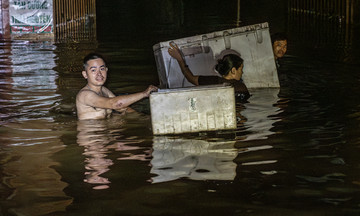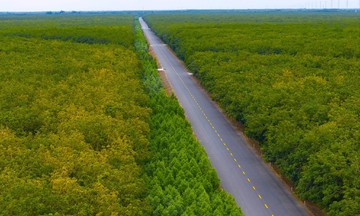In mid-September, the fields of Tan Chau, Hai Chau, Duc Chau, An Chau, Minh Chau, and Hung Chau, formerly part of Dien Chau district, were dotted with a startling sight: thousands of fake herons, egrets, and pond herons. These lifelike decoys, made of painted styrofoam, were planted close together among the rice paddies, alongside bamboo poles coated with strong adhesive. Hunters also use live birds with their eyes sewn shut or loudspeakers playing bird calls to lure their prey. Any bird landing near the decoys becomes instantly trapped, struggling only to become more entangled.
This practice has persisted for decades. Locals describe wild bird hunting as seasonal work, coinciding with bird migration in April and September. A successful night can earn hunters hundreds of thousands, or even millions, of Vietnamese dong—a significant sum in rural areas. "We know it's illegal under wildlife protection laws, but the income is substantial, and it's hard to give up," admitted a Tan Chau resident, viewing it as a difficult livelihood to abandon.
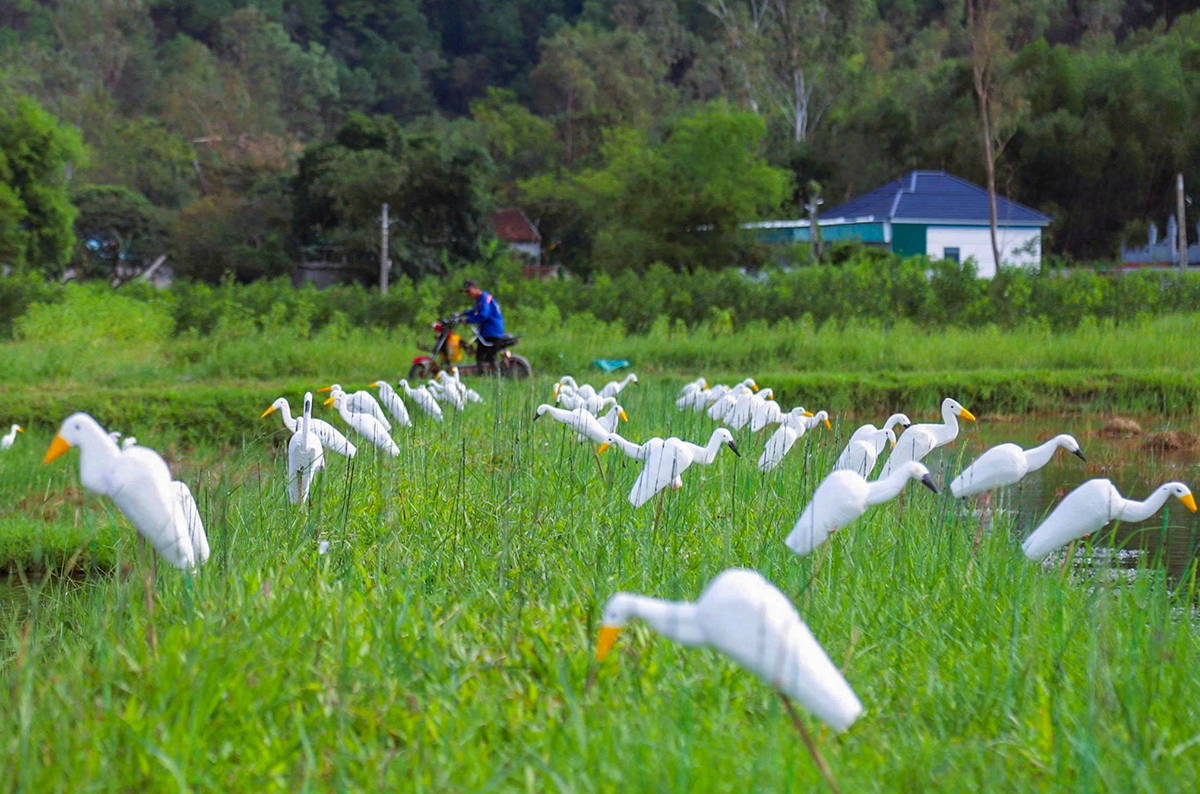 |
Fake herons planted in the rice fields of Tan Chau commune to trap migrating and wild birds in mid-September. Photo: Duc Hung |
Fake herons planted in the rice fields of Tan Chau commune to trap migrating and wild birds in mid-September. Photo: Duc Hung
Traders and restaurant owners readily purchase the captured birds. Wild bird dishes are considered a delicacy, attracting customers willing to pay a premium. A plate of roasted bird can cost over 200,000 dong, while a stewed bird pot can fetch between 500,000 and nearly one million dong. The attractive profit margins incentivize establishments to discreetly acquire and serve these dishes.
"Customers often inquire about wild bird meat," explained a restaurant owner near the coast, formerly in Dien Chau district. "If we don't have it, they'll go elsewhere. We have to do what we can to retain our customers."
Phan Van Hung, chairman of Tan Chau commune, reported that police investigations revealed hunters can earn two to three million dong per night during migration season, sometimes reaching a peak of 10 million dong. The high profits drive this clandestine activity, primarily among middle-aged and young adults. These individuals typically work in agriculture or fishing, supplementing their income with construction or loading jobs during off-seasons, earning a few hundred thousand dong per day. This undermines claims of low income as justification for poaching.
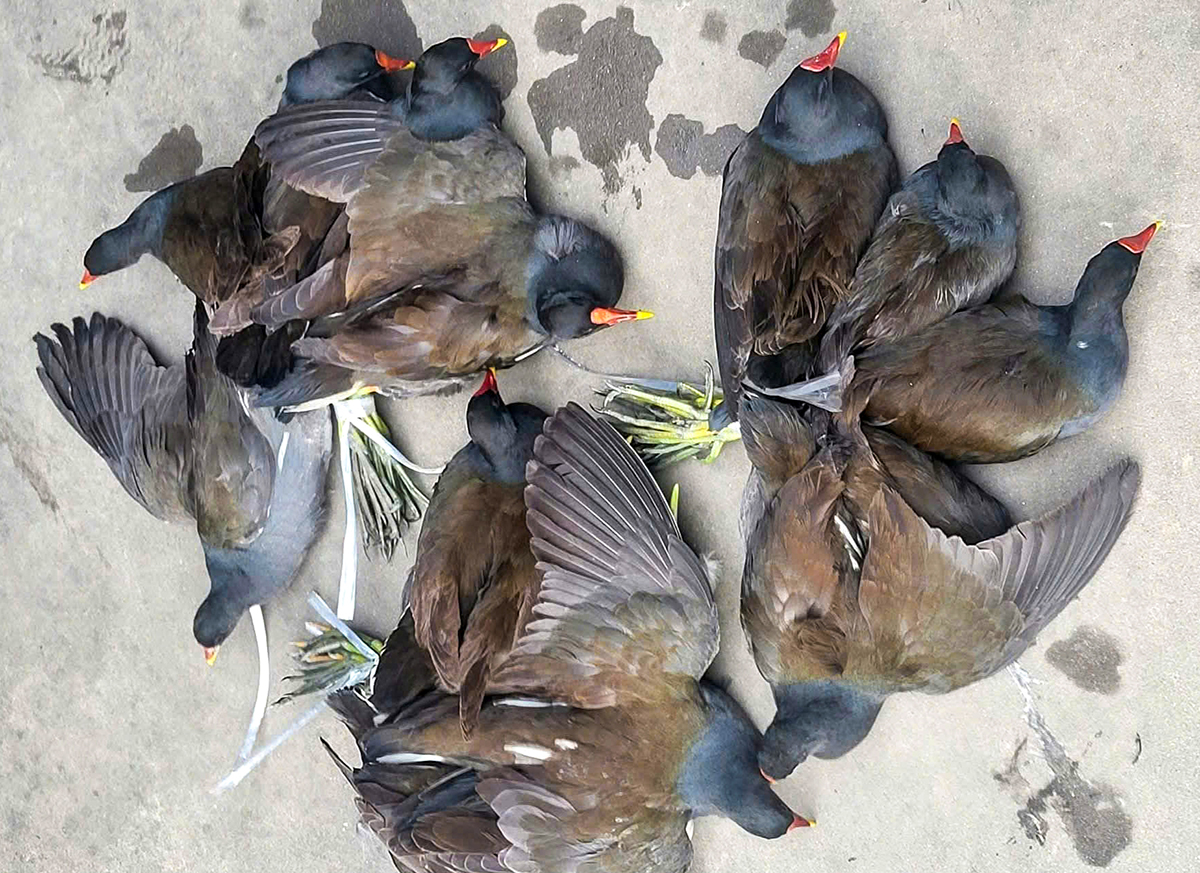 |
Trapped wild birds are sold at the market for 60,000-100,000 dong each, depending on the species. Photo: Hung Le |
Trapped wild birds are sold at the market for 60,000-100,000 dong each, depending on the species. Photo: Hung Le
"Previously, the former commune authorities were lenient," stated Hung. "Officials were often from the same village and primarily issued warnings, allowing poaching to continue year after year." With the recent implementation of a two-tiered local government system, new officials are mainly from outside the area, eliminating favoritism. However, information leaks prior to inspections often compromise evidence gathering.
Beyond the fields, wild birds and related dishes are carefully concealed within trading and processing establishments. Hung noted that market vendors often disguise their wares, only revealing wild bird meat to familiar customers. Restaurants operate similarly, omitting the dishes from menus and recording them under different names upon billing, making detection difficult.
Tran Ngoc Quyen, head of Dien Chau Forest Protection Department, explained that Decree 35/2019 sets fines for hunting, trapping, and killing wild birds ranging from 500,000 to 10 million dong, depending on the species and the violation's severity. Article 234 of the Penal Code stipulates that hunting, killing, or trading endangered species in Groups IB and II can result in prosecution, with a maximum penalty of seven years imprisonment.
Despite these strict penalties, Quyen admitted that no cases have been successfully prosecuted. The former Dien Chau district (now eight communes) spans over 331.6 km2, bordering both sea and forest. With only five patrol officers, comprehensive monitoring is impossible. Patrols require coordination with local police and military, which isn't always feasible. Even when arrangements are made, unfavorable weather can disrupt operations.
"Poachers typically operate at night in remote forest patches or large fields, areas lacking surveillance cameras," Quyen said. "We often confiscate traps but can't make arrests. If hunters deny ownership, we can't prosecute."
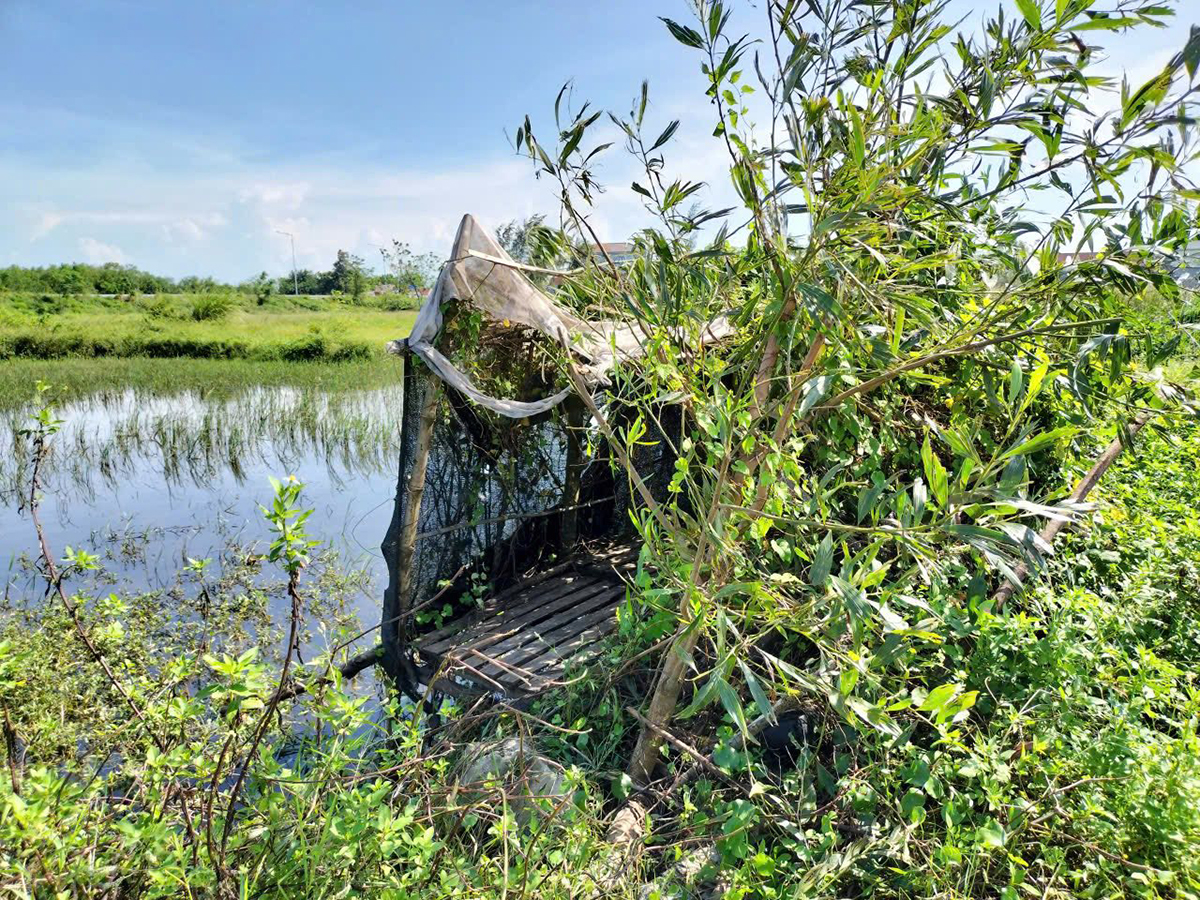 |
A makeshift hut in a field in the former Dien Chau district, used by poachers to watch for and hunt birds. Photo: Duc Hung |
A makeshift hut in a field in the former Dien Chau district, used by poachers to watch for and hunt birds. Photo: Duc Hung
What are the solutions?
Le Ngoc Huu, head of Quynh Luu - Hoang Mai Forest Protection Department, which borders the former Dien Chau district, shares the frustration with the decades-long poaching problem, which significantly harms the ecosystem and disrupts the natural balance. Migratory birds play a crucial role in pest control, but their mass extermination has severe ecological consequences.
"Combating this issue is like treating an addiction," Huu stated. "It requires sustained, long-term effort, consistently targeting both supply and demand while educating the public about changing their consumption habits."
Tan Chau chairman Phan Van Hung agrees that demand drives supply, necessitating a multi-agency approach involving economic departments, police, forest rangers, and market management to scrutinize the entire supply chain. "We must identify the poachers, traders, and consumers, understanding their methods," Hung explained. "Knowing the end points allows authorities to effectively target all parties involved." He cited successful interventions against dog theft and pig slaughtering during disease outbreaks, emphasizing the importance of disrupting consumption channels.
Hung acknowledged the former administration's leniency, contrasting it with the current administration's firmer stance, while also emphasizing the need for a balanced approach to avoid community backlash. The ingrained habit of consuming wild birds requires gradual change, combining firmness with flexibility.
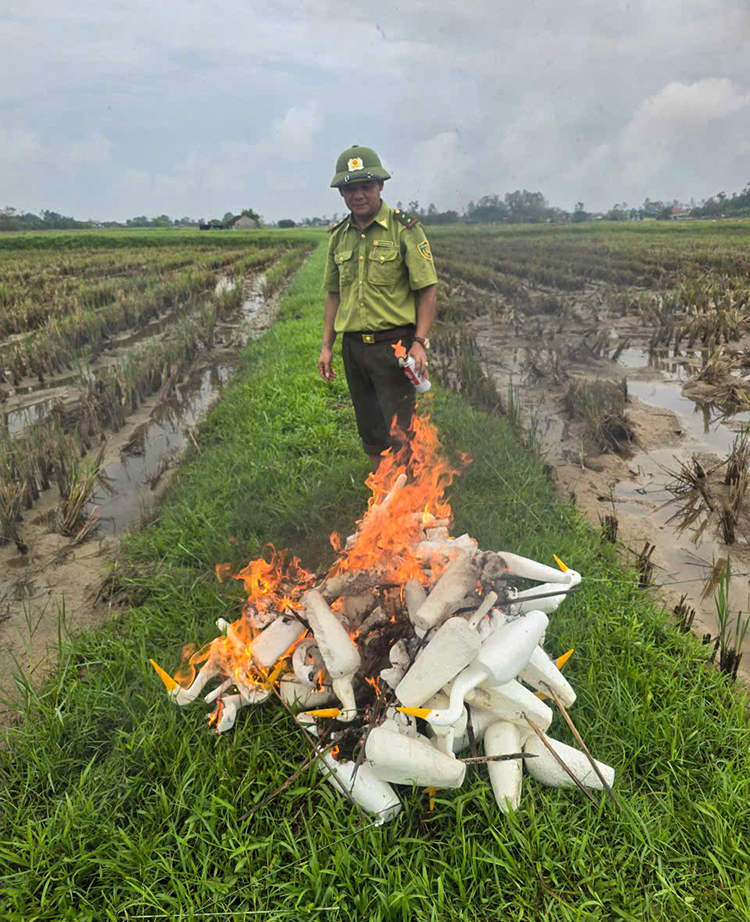 |
Dien Chau Forest Protection Department officers destroy fake birds in the fields in mid-September. Photo: Hung Le |
Dien Chau Forest Protection Department officers destroy fake birds in the fields in mid-September. Photo: Hung Le
Tan Chau commune also emphasizes ethical conduct, urging officials to refrain from consuming wild birds to set a public example. To avoid biased enforcement, Hung explained that the newly merged commune, formed from eight former communes, employs a "cross-enforcement" strategy, deploying officials from one area to another to minimize personal connections.
Since 10/9, Tan Chau's chairman has issued an official ban on hunting, trading, and processing wild birds. Inspection teams have targeted markets and restaurants, confiscating over 3,000 bird traps. While inspections have revealed a slight decrease in traps in some areas, new nets and decoys have appeared elsewhere.
"We will intensify enforcement," Hung asserted. "Serious cases will be referred for criminal investigation to deter future poaching."
The Nghe An Forest Protection Sub-department reported that since 15/9, it has conducted numerous inspections in collaboration with local authorities, seizing thousands of meters of netting, hundreds of bamboo stakes, and dismantling illegal hunting camps. Future operations will focus on large-scale sweeps, targeting processing and consumption points.
Duc Hung




